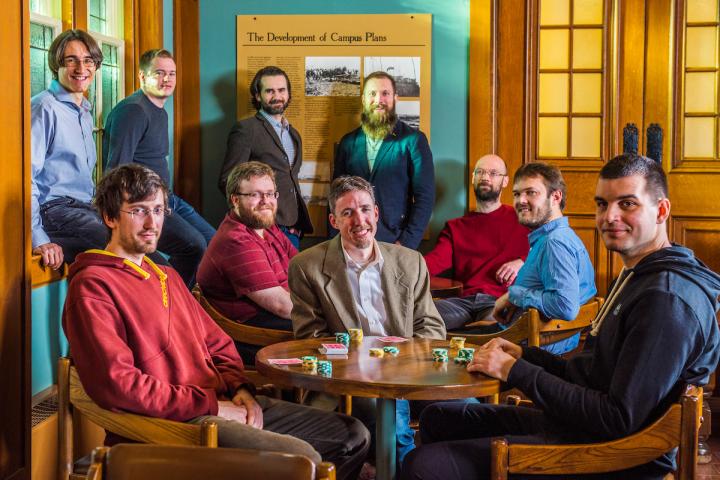AI-based poker playing programs have been upping the ante for lowly humans. Notably several algorithms from Carnegie Mellon University (e.g. Libratus, Claudico, and Baby Tartanian8) have performed well. Writing in Science last week, researchers from the University of Alberta, Charles University in Prague and Czech Technical University report their poker algorithm – DeepStack – is the first computer program to beat professional players in heads-up no-limit Texas hold’em poker.
Sorting through the “firsts” is tricky in the world of AI-game playing programs. What sets DeepStack apart from other programs, say the researchers, is its more realistic approach at least in games such as poker where all factors are never fully known – think bluffing, for example. Heads-up no-limit Texas hold’em (HUNL) is a two-player version of poker in which two cards are initially dealt face down to each player, and additional cards are dealt face-up in three subsequent rounds. No limit is placed on the size of the bets although there is an overall limit to the total amount wagered in each game.
“Poker has been a longstanding challenge problem in artificial intelligence,” says Michael Bowling, professor in the University of Alberta’s Faculty of Science and principal investigator on the study. “It is the quintessential game of imperfect information in the sense that the players don’t have the same information or share the same perspective while they’re playing.”
Using GTX 1080 GPUs and CUDA with the Torch deep learning framework, “we train our system to learn the value of situations,” says Bowling on an NVIDIA blog. “Each situation itself is a mini poker game. Instead of solving one big poker game, it solves millions of these little poker games, each one helping the system to refine its intuition of how the game of poker works. And this intuition is the fuel behind how DeepStack plays the full game.”

In the last two decades, write the researchers, “computer programs have reached a performance that exceeds expert human players in many games, e.g., backgammon, checkers, chess, Jeopardy!, Atari video games, and go. These successes all involve games with information symmetry, where all players have identical information about the current state of the game. This property of perfect information is also at the heart of the algorithms that enabled these successes,” write the researchers.
“We introduce DeepStack, an algorithm for imperfect information settings. It combines recursive reasoning to handle information asymmetry, decomposition to focus computation on the relevant decision, and a form of intuition that is automatically learned from self-play using deep learning.”
In total 44,852 games were played by the thirty-three players with 11 players completing the requested 3,000 games, according to the paper. Over all games played, DeepStack won 492 mbb/g. “This is over 4 standard deviations away from zero, and so, highly significant.” According to the authors, professional poker players consider 50 mbb/g a sizable margin. Using AIVAT to evaluate performance, we see DeepStack was overall a bit lucky, with its estimated performance actually 486 mbb/g.”
(For those of us less prone to take a seat at the Texas hold’em poker table, mbb/g equals milli-big-blinds per game or the average winning rate over a number of hands, measured in thousandths of big blinds. A big blind is the initial wager made by the non-dealer before any cards are dealt. The big blind is twice the size of the small blind; a small blind is the initial wager made by the dealer before any cards are dealt. The small blind is half the size of the big blind.)
It’s an interesting paper. Game theory, of course, has a long history and as the researchers note, “The founder of modern game theory and computing pioneer, von Neumann, envisioned reasoning in games without perfect information. ‘Real life is not like that. Real life consists of bluffing, of little tactics of deception, of asking yourself what is the other man going to think I mean to do. And that is what games are about in my theory.’ One game that fascinated von Neumann was poker, where players are dealt private cards and take turns making bets or bluffing on holding the strongest hand, calling opponents’ bets, or folding and giving up on the hand and the bets already added to the pot. Poker is a game of imperfect information, where players’ private cards give them asymmetric information about the state of game.”
According to the paper, DeepStack algorithm is composed of three ingredients: a sound local strategy computation for the current public state, depth-limited look-ahead using a learned value function to avoid reasoning to the end of the game, and a restricted set of look-ahead actions. “At a conceptual level these three ingredients describe heuristic search, which is responsible for many of AI’s successes in perfect information games. Until DeepStack, no theoretically sound application of heuristic search was known in imperfect information games.”
The researchers describe DeepStack’s architecture as a standard feed-forward network with seven fully connected hidden layers each with 500 nodes and parametric rectified linear units for the output. The ’turn’ network was trained by solving 10 million randomly generated poker turn games. These turn games used randomly generated ranges, public cards, and a random pot size. The flop network was trained similarly with 1 million randomly generated flop games.
Link to paper: http://science.sciencemag.org/content/early/2017/03/01/science.aam6960.full
Link to NVIDIA blog: https://news.developer.nvidia.com/ai-system-beats-pros-at-texas-holdem/





























































